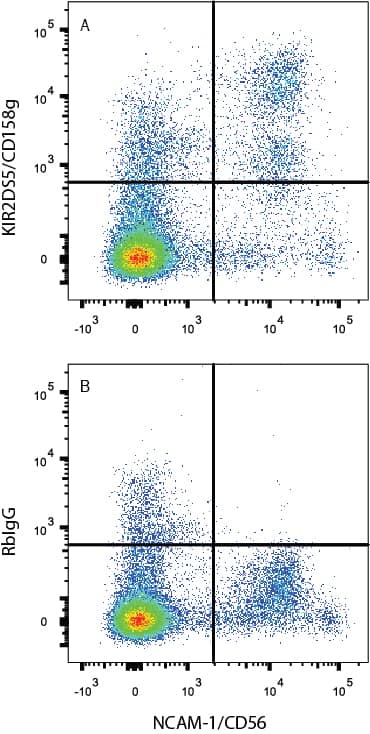Human KIR2DS5/CD158g Antibody
R&D Systems, part of Bio-Techne | Catalog # MAB8920
Recombinant Monoclonal Antibody.


Conjugate
Catalog #
Key Product Details
Species Reactivity
Human
Applications
Flow Cytometry
Label
Unconjugated
Antibody Source
Recombinant Monoclonal Rabbit IgG Clone # 1165A
Product Specifications
Immunogen
NS0 mouse myeloma cell line transfected with human KIR2DS5/CD158g
His22-His245
Accession # Q14953
His22-His245
Accession # Q14953
Specificity
Detects human KIR2DS5/CD158g in direct ELISAs.
Clonality
Monoclonal
Host
Rabbit
Isotype
IgG
Scientific Data Images for Human KIR2DS5/CD158g Antibody
Detection of KIR2DS5/CD158g in BaF3 Mouse Cell Line Transfected with Human KIR2DS5/CD158g by Flow Cytometry.
BaF3 mouse pro-B cell line transfected with human KIR2DS5/CD158g was stained with Rabbit Anti-Human KIR2DS5/CD158g Monoclonal Antibody (Catalog # MAB8920, filled histogram) or Rabbit Anti-Human KIR3DL3/CD158z Monoclonal Antibody (Catalog # MAB8919, open histogram), followed by Allophycocyanin-conjugated Anti-Rabbit IgG Secondary Antibody (Catalog # F0111).Detection of KIR2DS5/CD158g in Human PBMCs by Flow Cytometry.
Human peripheral blood mononuclear cells (PBMCs) were stained with (A) Mouse Anti-Human KIR2DS5/CD158g Monoclonal Antibody (Catalog # MAB8920) or (B) Rabbit IgG Isotype Control (Catalog # MAB1050) followed by Allophycocyanin-conjugated Anti-Rabbit IgG Secondary Antibody (Catalog # F0111) and Mouse Anti-Human NCAM-1/CD56 PE-conjugated Monoclonal Antibody (Catalog # FAB2408P). View our protocol for Staining Membrane-associated Proteins.Applications for Human KIR2DS5/CD158g Antibody
Application
Recommended Usage
Flow Cytometry
0.25 µg/106 cells
Sample: BaF3 mouse pro-B cell line transfected with human KIR2DS5/CD158g and Human Peripheral Blood Mononuclear Cells (PBMCs)
Sample: BaF3 mouse pro-B cell line transfected with human KIR2DS5/CD158g and Human Peripheral Blood Mononuclear Cells (PBMCs)
Formulation, Preparation, and Storage
Purification
Protein A or G purified from cell culture supernatant
Reconstitution
Reconstitute at 0.5 mg/mL in sterile PBS. For liquid material, refer to CoA for concentration.
Formulation
Lyophilized from a 0.2 μm filtered solution in PBS with Trehalose. *Small pack size (SP) is supplied either lyophilized or as a 0.2 µm filtered solution in PBS.
Shipping
Lyophilized product is shipped at ambient temperature. Liquid small pack size (-SP) is shipped with polar packs. Upon receipt, store immediately at the temperature recommended below.
Stability & Storage
Use a manual defrost freezer and avoid repeated freeze-thaw cycles.
- 12 months from date of receipt, -20 to -70 °C as supplied.
- 1 month, 2 to 8 °C under sterile conditions after reconstitution.
- 6 months, -20 to -70 °C under sterile conditions after reconstitution.
Background: KIR2DS5/CD158g
Long Name
Killer Cell Immunoglobulin-like Receptor, Two Domains, Short Cytoplasmic Tail, 5
Alternate Names
CD158g, NKAT9
Entrez Gene IDs
3810 (Human)
Gene Symbol
KIR2DS5
UniProt
Additional KIR2DS5/CD158g Products
Product Documents for Human KIR2DS5/CD158g Antibody
Product Specific Notices for Human KIR2DS5/CD158g Antibody
For research use only
